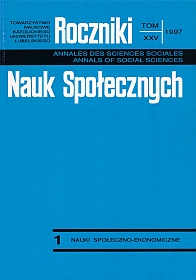Rozumienie kategorii „społeczeństwa zamkniętego” w myśli Karla R. Poppera
Abstrakt
The paper depicts the understanding of socio-philosophical category of „closed society” (totalitarianism) in the thought of Karl R. Popper - a prominent European philosopher.
To explicate the issue „closed society” has been put in such approach to social sciences which demands of these sciences to discover necessary prophecies, schemes or algorithms accountable for the (future) history of human communities. This approach, in Popper’s terms is called „historicism”, and makes up the theoretical ground of totalitarianism, its genesis reaching back to Greek antiquity.
The leading proponents of social philosophy, which bears a value of historicism, are for Popper such thinkers as Plato, Hegel and Marx.
Plato’s historicism results from his metaphysics and conception of idea (form): every entity possesses it, including the state. One should come closer to it, stopping social downfall, which implies struggle against any manifestation of social change, a change that distances one from a full realization of the ideal state. Popper thinks that with Plato social theory took on a totalitarian dimension, taking advantage, among other things, of eugenics or recognition being given to the priority of organistic understanding of state over man.
Hegel, too, accepts the idea of (moving) entity and called this idea the Spirit (soul) of entity; he is another totalitarian historicist. Progress in the world is being brought about by means of dialectic development of the spirit. Organically defined state and nation (in which the Spirit is acting) are higher manifestation of that progress. The arena of history is the stage upon which state and nation act, whereas war and conquests are the most mature manifestations of that activity. The nationalistic, militaristic, collectivistic and organicistic ideas presentin Hegel are - according to Popper - a nourishment for totalitarianism.
Now Marx accepts economic historicism which consists in the recognition that sociopolitical phenomena are entirely determined by economic phenomena. This allows us, within the framework of historical materialism, to create prophecy about the further course of history and proclaim the future model, that is „"classless society”. A belief in the necessary social laws made Marx proclaim revolution which would blaze a trail for the prophecy to come true. This vision, too, was based on the deterministic and collectivistic presuppositions.
According to Popper, the fact that constitutive moments of „totalitarianism as such” have been explicated, proved that this system accepts, among other things, such philosophical presuppositions as irrationalism (its anthropological and cognitive aspect), determinism, dogmatism, holism and utopism (in the sphere of politics), collectivism and organicism (in the sphere of ontic definition of the status of individuals and communities), relativism, imperialism, and it stresses antagonisms (in the sphere of actual activity), collective egoism and negation of individual responsibility (in the aspect of axiological presumptions of this acting). Totalitarianism levels entirely freedom, truth and - which has been pinpointed - responsibility as the values of social life, leaving their rationing to the authorities.
Copyright (c) 1997 Roczniki Nauk Społecznych

Utwór dostępny jest na licencji Creative Commons Uznanie autorstwa – Użycie niekomercyjne – Bez utworów zależnych 4.0 Międzynarodowe.


